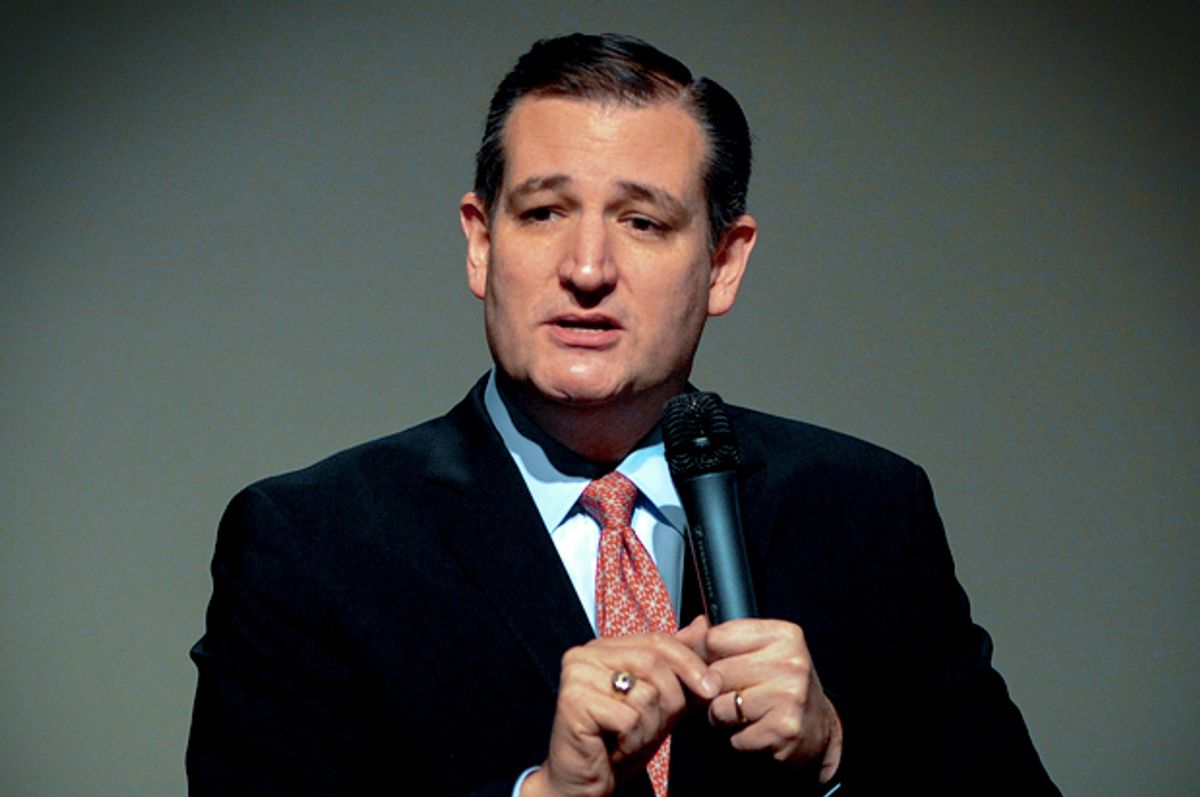The Washington Post's Dave Weigel is responsible for some of the very best reporting we've seen so far during this campaign cycle. His August piece on white working-class supporters of Donald Trump, for example, was both insightful and ahead of the curve. More than most of the countless pieces with a similar theme, Weigel's article helped those of us who could never support Trump at least imagine why someone might. That's good journalism.
That's also how we should understand Weigel's latest, a dispatch from Alabama explaining why senator and presidential candidate Ted Cruz's standing with the GOP base has not suffered, despite his fellow senator and presidential rival Marco Rubio's recent attack over his immigration policies. According to Weigel, the reason that Cruz's lawyerly answers have not backfired, as many outside observers expected, is because his audience is so ensconced in a right-wing media bubble that often goes 180 degrees against the mainstream narrative:
From the outside, it might have looked like the Cruz brand was damaged, but his campaign saw no evidence of that. The fight over the immigration bill — co-sponsored by Rubio as a member of the Gang of Eight that crafted it — was not obscure to conservative voters. Cruz’s lawyerly strike against it was not seen as slippery; it was seen as smart. In Alabama, voters could rattle off the details of the bill, as well as their problems with the end-of-year omnibus Cruz had just voted against. They knew Washington enough not to trust it.
It's not simple contrarianism that's inoculated Cruz, though. Weigel finds that another reason why Rubio's punches didn't land is because so many people in the GOP base rely almost exclusively on far-right media, which by and large loves Cruz and has often already made arguments in his defense for him. Here's an example, from a recent Cruz campaign event:
[Cruz] treated his audiences to unusually long, substantive introductions about the Senate’s workings and video tributes from people who might be obscure outside the conservative movement. A strip that now plays before every stop features Ginni Thomas, the wife of Supreme Court Justice Clarence Thomas; Paul Pressler, a conservative who helped turn the Southern Baptist Convention to the right; and Brent Bozell, the founder of multiple Virginia-based conservative groups.
They’re echoed in audio clips of Sean Hannity, Mark Levin and Rush Limbaugh, multiplatform stars who reach millions of conservatives. Each of them, to the delight of the Cruz campaign, had taken his side in the immigration tete-a-tete. Anyone who pays attention to them had heard them enforce the campaign’s message.
Because they were thoroughly prepped by the far-right media, and because they heard Cruz defended by other far-right stars, like Rep. Mo Brooks and Sen. Jeff Sessions, the rally attendees, Weigel writes, had "only two reads on this argument." The first? "[T]hat Cruz was telling the truth because he had earned that trust." The second? "[T]hat Cruz was probably telling the truth and a quick check confirmed it." Confirmation bias and new media make for one helluva drug.
Cruz is hardly the first extreme conservative to benefit from what the blogosphere likes to (pretentiously) describe as the "epistemic closure" of the right-wing. The public's ability to filter-out any facts or opinions that don't jibe with its values or prejudices has been widely noticed, and it's not exclusive to those on the right. Still, while you can find it almost everywhere, it's most conspicuous within the conservative movement. And perhaps more than any candidate besides Trump, Cruz is great at making would-be supporters believe that he's smack dab in the middle of the bubble with them.
Cruz is so good at reaching these people, in fact, that you could argue he's made pandering to them the cornerstone of his presidential campaign's strategy. As Ed Kilgore and others have noted, Cruz is prospering in part because he is telling the GOP base one of the things it most wants to hear. Namely, that Republicans need not make any effort whatsoever to appeal to people of color; that the party can continue to win by going all-in with the white evangelical vote. This is sometimes called the "missing white voter" theory; and it is the foundation of Cruz's entire operation.
Not surprisingly, this sounds might good to the GOP base's ears. And, not surprisingly, it seems to be total bunk. For one thing, the data the theory is premised on is questionable. But even with that aside, the missing voter theory only makes sense if one assumes either that only "missing" voters who are white will show up (unlikely) or that all the evangelicals who didn't vote in 2012 are conservative (they're not). It's a delusion, in other words — but one in which many Republican voters, following the lead of right-wing media stars, now fervently believe.
What Cruz is offering to Republican voters, in effect, is permanent residency in the movement's preferred alternative reality. For the first time perhaps ever, he is offering them the chance to vote for a viable primary candidate who not only pays attention to the Limbaughs and Hannitys, but lives in the fantasy with them. And because GOP elites are increasingly terrified that Donald Trump really will win the nomination, Ted Cruz, the Alternative Reality Candidate, is starting to look to them like the lesser evil (despite the fact that he's spent so much of this campaign mimicking Trump).
Is it any wonder, then, that Cruz is rising? Most of his competitors are offering GOP voters a strong chance to defeat Hillary Clinton. Cruz, on the other hand, is offering to let them stay in a make-believe world they vastly prefer to our own.


Shares